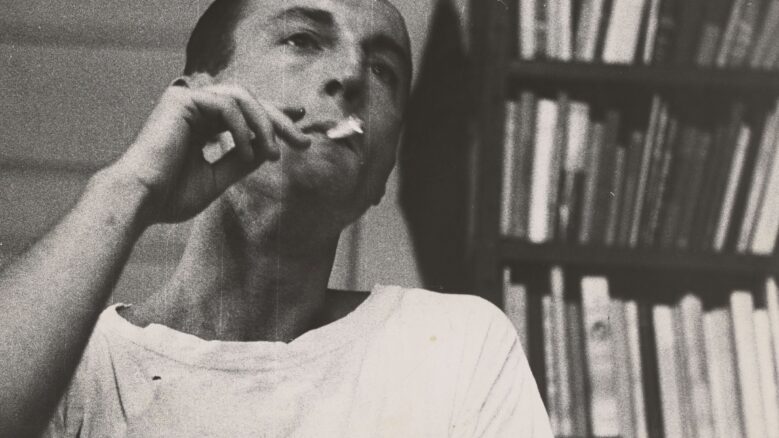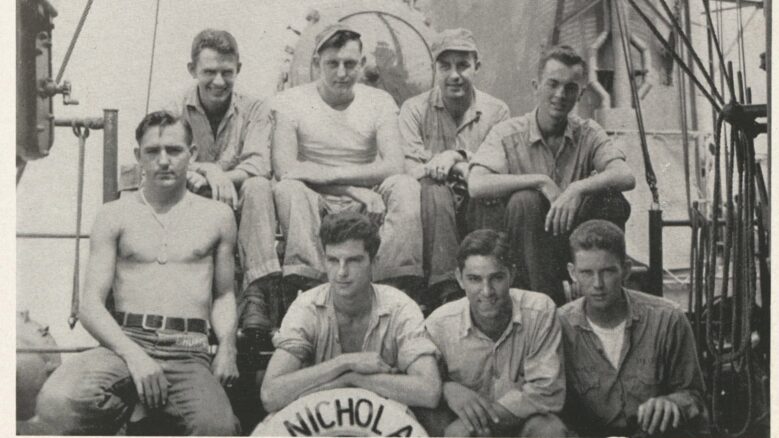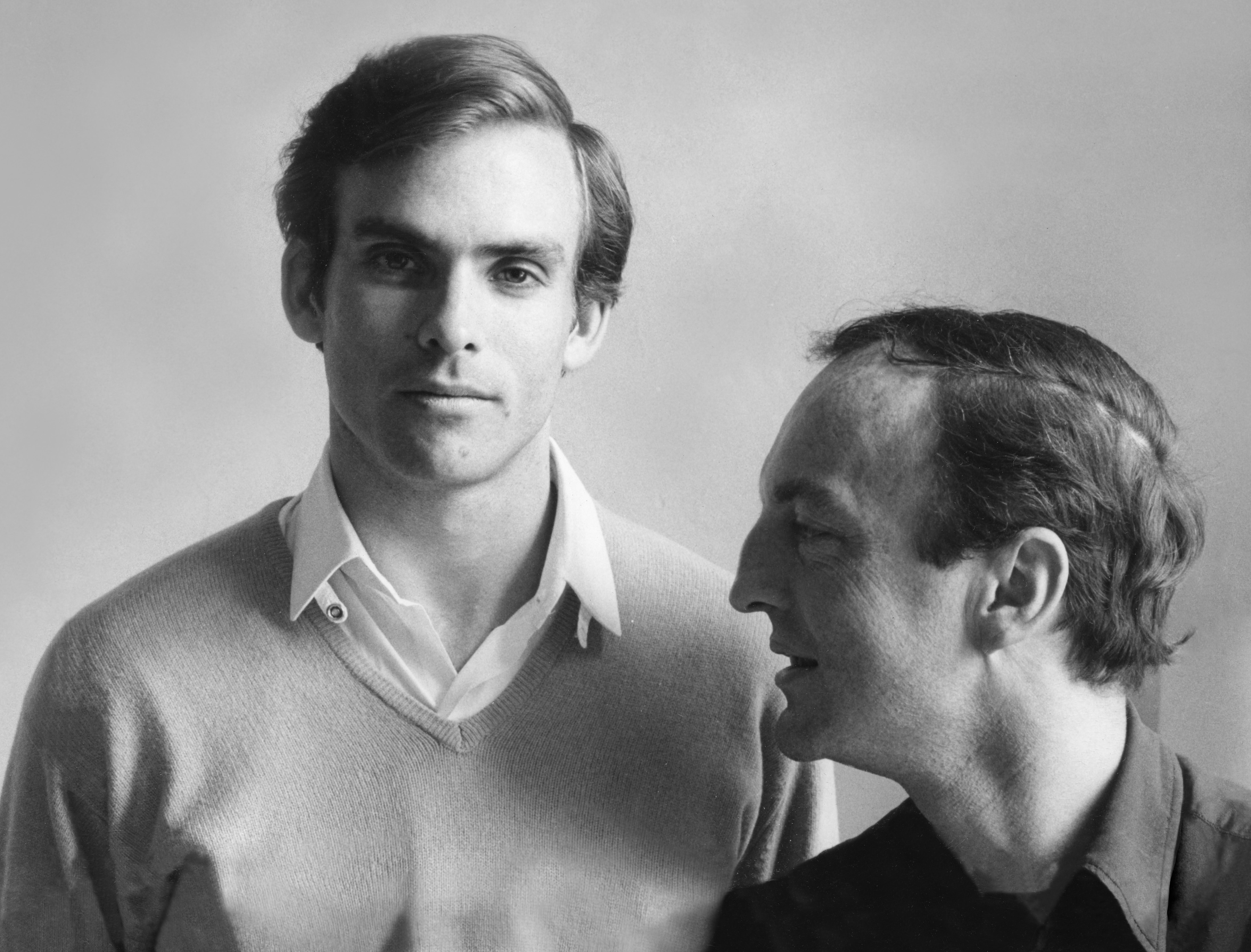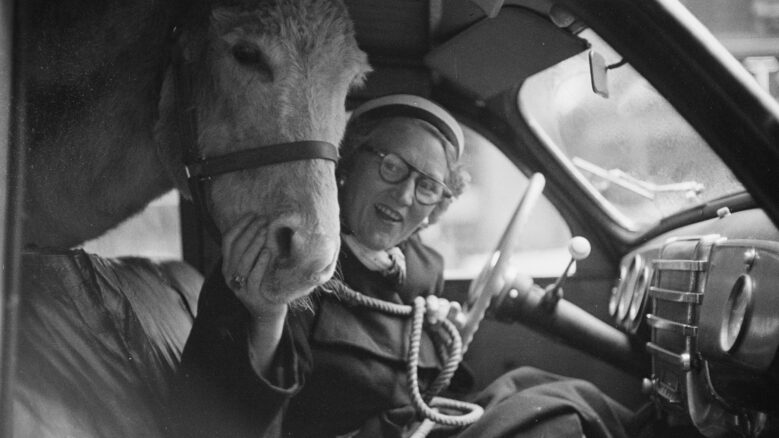A portal into 1950s New York City, Frank O’Hara’s “Lunch Poems” have the feel of playing hooky: of roaming from museums to Central Park and sneaking into cinemas. Choreographer Mark Morris, poets Terrance Hayes, Robert Pinsky, Todd Colby, and Eileen Myles, and musical duo Rachael and Vilray join host Elisa New to read “Steps,” O’Hara’s ode to NYC art and dance.
Interested in learning more? Poetry in America offers a wide range of courses, all dedicated to bringing poetry into classrooms and living rooms around the world.
By Frank O’Hara
How funny you are today New York
like Ginger Rogers in Swingtime
and St. Bridget’s steeple leaning a little to the left
here I have just jumped out of a bed full of V-days
(I got tired of D-days) and blue you there still
accepts me foolish and free
all I want is a room up there
and you in it
and even the traffic halt so thick is a way
for people to rub up against each other
and when their surgical appliances lock
they stay together
for the rest of the day (what a day)
I go by to check a slide and I say
that painting’s not so blue
where’s Lana Turner
she’s out eating
and Garbo’s backstage at the Met
everyone’s taking their coat off
so they can show a rib-cage to the rib-watchers
and the park’s full of dancers with their tights and shoes
in little bags
who are often mistaken for worker-outers at the West Side Y
why not
the Pittsburgh Pirates shout because they won
and in a sense we’re all winning
we’re alive
the apartment was vacated by a gay couple
who moved to the country for fun
they moved a day too soon
even the stabbings are helping the population explosion
though in the wrong country
and all those liars have left the UN
the Seagram Building’s no longer rivalled in interest
not that we need liquor (we just like it)
and the little box is out on the sidewalk
next to the delicatessen
so the old man can sit on it and drink beer
and get knocked off it by his wife later in the day
while the sun is still shining
oh god it’s wonderful
to get out of bed
and drink too much coffee
and smoke too many cigarettes
and love you so much
How funny you are today New York
like Ginger Rogers in Swingtime
and St. Bridget’s steeple leaning a little to the left
here I have just jumped out of a bed full of V-days
(I got tired of D-days) and blue you there still
accepts me foolish and free
all I want is a room up there
and you in it
and even the traffic halt so thick is a way
for people to rub up against each other
and when their surgical appliances lock
they stay together
for the rest of the day (what a day)
I go by to check a slide and I say
that painting’s not so blue
where’s Lana Turner
she’s out eating
and Garbo’s backstage at the Met
everyone’s taking their coat off
so they can show a rib-cage to the rib-watchers
and the park’s full of dancers with their tights and shoes
in little bags
who are often mistaken for worker-outers at the West Side Y
why not
the Pittsburgh Pirates shout because they won
and in a sense we’re all winning
we’re alive
the apartment was vacated by a gay couple
who moved to the country for fun
they moved a day too soon
even the stabbings are helping the population explosion
though in the wrong country
and all those liars have left the UN
the Seagram Building’s no longer rivalled in interest
not that we need liquor (we just like it)
and the little box is out on the sidewalk
next to the delicatessen
so the old man can sit on it and drink beer
and get knocked off it by his wife later in the day
while the sun is still shining
oh god it’s wonderful
to get out of bed
and drink too much coffee
and smoke too many cigarettes
and love you so much
Frank O’Hara, “Steps” from Lunch Poems. Copyright © 1964 by Frank O’Hara. Used with
the permission of The Permissions Company, LLC on behalf of City Lights Books,

In the 1950s and 60's, Frank O’Hara’s witty and urbane verse opened a new vein of American poetry. He was celebratory without being ceremonial, personal without plunging into inner pain. The previous generation of poets, like Eliot and Pound, were traditional and referential, writing verse as though forming new crystals on the rock face of western literature. Contemporary poets, like Robert Lowell or John Berryman, were heavy too, chipping off lead shards from their pained private lives. O’Hara’s work was lighter, more ironic, and more social—if he was concerned with a mineral, it was rock candy. “Steps” is a celebration, not of some major historical event or personal landmark, but of a day, or many days, enjoying New York City. Image Credit: "Photo by Walter Silver ©The Miriam and Ira D. Wallach Division of Art, Prints and Photographs: Photography Collection, The New York Public Library"

“Frank O'Hara emphasizes poetry as fun. I believe, he says, it has to be at least as interesting as the movies. He is eager to break down a kind of classroom solemnity.” - Poet Robert Pinsky

His liveliness does not imply that O’Hara was living beyond concern. As poet Terrence Hayes notes: “If you just read him very casually, you won't ever notice that he is actually often talking about a kind of longing blueness. There's always like this basement of darkness contending with not getting too sunken down.”

“I have just jumped out of a bed full of V-days / (I got tired of D-days) and blue you there still / accepts me foolish and free.” O’Hara, pictured above top right, served as a Navy sonarman in WWII. In the second stanza of “Steps,” the speaker compares his triumphant day to the great end-of-war celebrations. There has been tragedy and loss, yes, but today is about triumph, not mourning. Image courtesy of Naval History and Heritage Command

There was an external reason for O’Hara's good attitude: He was in love. The “you” in the poem represents both New York (“How funny you are today New York”) and O'Hara's partner Vincent Warren (all I want is a room up there / and you in it), who had transformed life in the city for O'Hara (“oh god it's wonderful / to get out of bed / and drink too much coffee / and smoke too many cigarettes / and love you so much”). For O'Hara, the city has become a sort of parade of personal happiness—dancers, liquor, musicals, Lana Turner, all pop up to make him smile. O’Hara can’t even get down on knife attacks: “Even the stabbings are helping the population explosion.” The above image, of O’Hara and Vincent Warren, is by George Montgomery, courtesy of Bibliothèque de la danse Vincent-Warren.

“The poem comes from a moment when it was all working. Do you know what I mean? That there's a moment when it's great that you drank too many drinks and smoked too many cigarettes, but you're so kind of vital and strong that it's like - yay!” - Poet Eileen Myles.

A day out in the city, when not dulled by familiarity or dimmed by overwork, is an exciting, surprising experience. O’Hara’s poem, written many years into his time in New York, combines the knowledge of a local with the wide eyes of a tourist. In the above image, we see a typically unusual New York sight: A donkey being escorted by cab to the Metropolitan Opera. Image courtesy of Frank Bauman, John Vachon (1914-1975), Look magazine (X2011.4.127-52.26) Museum of the City of New York